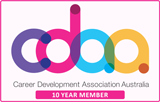
Developing Career Coaching Skills
Developing Career Coaching Skills is not only about developing the skills to assist clients with their career issues. On a deeper level, it essentially involves having self-understanding and self-awareness about who you are personally and what you bring to the counselling/coaching relationship and process.
An effective counsellor/coach can build rapport and trust, explore issues, understand the client's feelings, assist the client in seeing things clearly, and facilitate positive transformation for change. The client-centred approach does not focus on the past, instead, it has a focus on the present and future to achieve personal growth.
Counselling and coaching are rooted in the principle that the client is responsible for
improving their life, not the counsellor/coach. The client consciously and rationally decides what is wrong and what should be done about their situation. Both parties are equal partners in the relationship rather than the counsellor/coach as an expert treating a client. The role of the counsellor/coach is to support the client to help themselves make a change.
AIMS
- Develop a client-centred counselling/coaching approach to your practice
- Apply a structured and consistent structure to each counselling/coaching session to ensure that each stage is addressed, and each party takes responsibility
- Applying a range of models to structure the Counselling/Coaching sessions to provide an informed and evidence-based approach.
- Apply reflective practice to reflect on your actions and take a constructive attitude to engage in continuous learning.
AUDIENCE
For individuals seeking international course accreditation in career development practice
to work in a global environment with organisations and clients, develop and update their knowledge and skills in career development, or fill a skills gap in their practice.
The course is suitable in various contexts and roles, including schools, education, training, in the workplace in human resources or psychology, and/or experience working in employment, recruitment, outplacement, youth work, apprenticeship, disability and rehabilitation, case management, or management.
LEARNING OUTCOMES
Upon completion of the course, participants will be able to:
- Apply a client-centred career development approach to your practice that allows a non-directive where both parties are equal partners, and the career counsellorcoach is non judgemental on the client’s situation, feelings, or solutions.
- Apply a consistent structure to a career development session and a sequence of sessions to ensure that each stage is addressed, and each party takes responsibility.
- Applying a range of models to structure the career development session and a sequence of sessions to provide an informed and evidence based approach.
- Apply reflective practice to reflect and take a constructive attitude to engage in continuous learning.
- Discriminate and apply two types of reflection: Reflection on action and Reflection in action to your work
- Understand and appreciate the benefits of critical reflection and professional practice to improve one’s work
COURSE CONTENT
- Client-centred career development approach
- Ten tips for Client-Centred Career Development Practitioners
- Structuring a career development session and a program
- Stage 1 — Opening — initial contact with the client
- Stage 2 — Exploring Client Understanding Information gathering
- Stage 3 — Subsequent counselling/coaching sessions
- Stage 4 — Coaching intervention
- Stage 5 — Commitment to action
- Stage 6 — Evaluation, termination, or referral
- Applying a range of models to structure of the Counselling/Coachingsessions that include:
o Skovholt’s Cycle of Caring
o Egan’s Skilled Helper Model
o GROW Model - Reflective practice
- Two types of reflection: Reflection on action and Reflection in action
- Benefits of critical reflection and professional practice
Professional Development
CERTIFICATE

Upon successfully finishing the complete course, students will receive a Certificate of Professional Development accredited by Associated Career Professionals International.
Students can also receive a Certificate of Professional Development for each course they complete accredited by Associated Career Professionals International.
CONTINUING PROFESSIONAL DEVELOPMENT POINTS

The time spent on each course of study may be claimed as continuing professional development (CPD) by CDAA members towards Career Development Association of Australia (CDAA) requirements.
Non-CDAA members, please check with your professional association regarding their CPD policy
To claim your CPD points, present your certificate of course completion to CDAA or the professional association where you are a member.
Developing Career Coaching Skills


 Contact Us
Contact Us